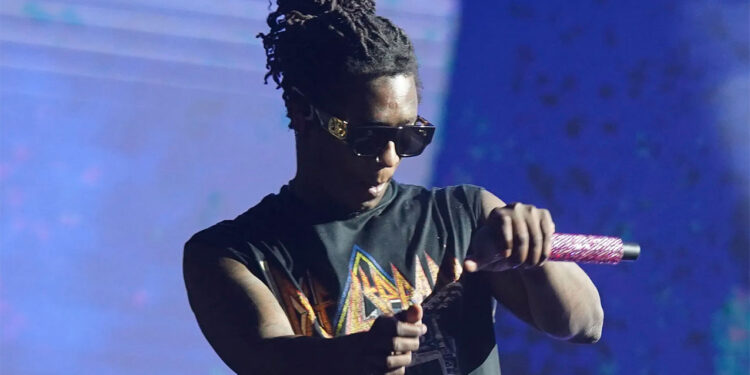Young Thug and Gunna will soon find out.
The musical case against the musicians — who face RICO charges for alleged gang activity — is built on decades of racist precedent. By Hady Mawajdeh and Sean Rameswaram
Young Thug and Gunna will soon find out.
The musical case against the musicians — who face RICO charges for alleged gang activity — is built on decades of racist precedent. By Hady Mawajdeh and Sean Rameswaram
Back in May, rapper and record label exec Young Thug was arrested on suspicion of gang activity and conspiracy to violate Georgia’s criminal racketeering law. Days later, Gunna — Young Thug’s Billboard-topping protégé who is signed to his label — and 26 others were charged in a 56-count RICO indictment for gang activity, including robbery and murder.
“Prosecutors are alleging that they are part of a gang that has committed a number of crimes throughout Atlanta,” said Jewel Wicker, editor-at-large for Capital B Atlanta in an interview with Today, Explained host Sean Rameswaram. “It’s worth noting that prosecutors are alleging that Gunna and Young Thug aren’t just members of this gang, but that they’re the leaders of it.” Prosecutors believe Young Thug used his record label Young Stoner Life, aka YSL, to create a criminal enterprise that furthered activity dating back to 2013.
Fulton County District Attorney Fani Willis held a news conference after the rappers were detained, where she said her “number one focus is targeting gangs.” Willis told reporters, “They are committing conservatively 75 to 80 percent of all of the violent crime that we are seeing within our community.”
Willis, who is known for asking a grand jury to investigate whether former President Donald Trump tried to overturn Georgia’s election results, also said that her team might use lyrics as evidence against the rappers indicted in the case. The indictment cites lyrics from 11 songs from both artists, which have come up several times in bond hearings. The question of whether or not rap lyrics should be admissible in court has been an ongoing debate for decades. In fact, the state of New York is currently considering a bill that would limit the use of lyrics in criminal cases, and California just passed a similar bill.
For some perspective on the topic, Today, Explained spoke to civil rights attorney, professor, and rapper Timothy Welbeck on Vox’s daily news explainer podcast. Read on for a partial transcript of the conversation, edited for length and clarity.
Sean Rameswaram
Timothy, we’re discussing the arrests and charges against rappers Young Thug and Gunna. It seems as though prosecutors plan to use lyrics from their songs in their case against them for RICO charges. How do you feel about this approach?
Timothy Welbeck
As a whole, I generally discourage the practice. I particularly take issue with it because at its core, rap lyrics are a form of artistic expression, and it’s a medium in which people not only communicate their lived experience, but also delve deeply into their imagination as well. We want to give them liberty to do that. To have people create this genuine form of art and then to potentially suffer some type of punishment as a result of it is what I find to be troubling, particularly because of the racial dynamics to it, too.
Sean Rameswaram
This has been a debate that’s been going on for decades. Tell me about that history. Where does it start?
Timothy Welbeck
Circa the late ’80s, we began to see a different level of content that was beginning to enter into the popular space, beginning with Schoolly D’s “P.S.K.,” Ice T’s “6 ’n the Mornin,’” then N.W.A.’s catalog. It began to create a shift in not only the type of music that was coming out, but how it was speaking to certain social conditions. Very quickly, people began to term that “gangsta rap.” Tipper Gore, among others, began a campaign trying to censor “gangsta rap” and paint it as something that was untenable for public consumption.
“There are songs about rape, throat killing, sadomasochism,” Tipper Gore told WDEF TV in 1986. “There’s a song that goes, ‘Not a woman, but a whore. I can taste the hate. Well, now I’m killing you. Watch your face turning blue,’ by a group that has sold 2 million copies of that particular album. They’re very popular with young kids.”
As that debate continued raging into the early ’90s, you began to see prosecutors using rap lyrics as a form of evidence against people in trial. You also had prosecutors literally saying, these rap lyrics are almost like party confessions.
Sean Rameswaram
How successful have prosecutors been using this approach? Do the lyrics tip the scales in their favor? Are they winning cases?
Timothy Welbeck
You have to have the court agree that these lyrics can even be introduced as evidence. Many defense attorneys have argued that lyrics are immaterial, they’re irrelevant, they’re prejudicial, things like that. Defense attorneys and most of these cases that I just mentioned have lost those motions, trying to suppress that type of evidence to try to keep it out of trial.
Now that they can be used in trial, how influential are they for the jury? It seems as though in some of these cases, they are having an impact on how the jury is weighing the evidence. If nothing else, when used in court, the thing that many people are arguing about is how painting a narrative about some of these rappers and the genre of rap as a whole — rappers themselves, as individuals, and then particularly those who are standing trial — is getting people to believe that they’re predisposed to committing certain criminal acts, even if these are entirely fictitious accounts or forms of artistic expression and the like.
Sean Rameswaram
Have there been cases where the art wasn’t fictitious? Where is the line? If a rapper says, “I killed Mike on 354 State Street,” and they go to 354 State Street and they find Mike there, is that something that can be further investigated, or should there be this golden rule that “Well, that was art, man, you can’t be using art in court?”
Timothy Welbeck
That’s where a lot of the debate hinges. What most people will say is that if you make a specific claim in lyrics that point to a specific crime, that only the person who committed the crime could have known, you should reasonably expect that your lyrics will be used against you. As MF Doom said, “You be a rap snitches, telling all your business, going into court, be your own star witness.” In that instance it’s permissible and it makes sense.
But what most people are decrying is the broader sense in which rap lyrics are used to paint a narrative about young Black men and women having a predisposition to commit criminal offenses, that they’re inclined to be inherently violent, and as a consequence, you can use their lyrics almost to a subtle degree as a form of evidence. That’s what people have an issue with.
When you look at criminal proceedings, what we have to weigh is that the court, if they’re successful, are going to deprive you of your life, your liberty, or your property. In order to do that, they have to meet a burden of proof. They have to establish that you committed a crime beyond a reasonable doubt. To only base that on rap lyrics is insufficient.
Sean Rameswaram
Where do you think we’re heading with Young Thug and Gunna, two of the biggest rappers in the United States, and thus, the world?
Timothy Welbeck
I think it’s different with each of them. On its face, the initial indictment I thought was lazy in some of its presumptions. I think what has shifted our analysis in the time since is that we have learned that there are people who are willing to testify against Young Thug. There’s other evidence that the prosecution believes that they have that they can use against him.
I think that’s what shifts the scales against Thug, and regrettably, he is facing potentially some serious time in prison based on if, again, the prosecution can prove that beyond a reasonable doubt. It appears as though the prosecution, at the very least with Thug, has more evidence against him than just his lyrics. That’s something that should be troubling to him. So we’ll see how it goes.
Original Article HERE

